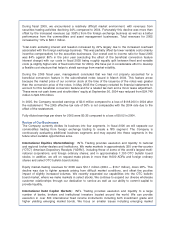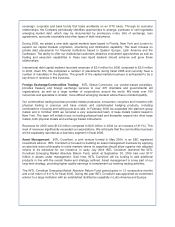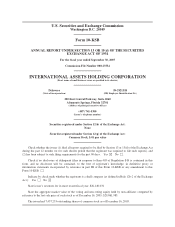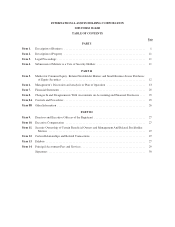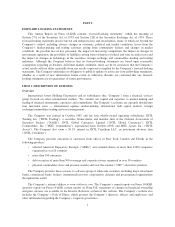INTL FCStone 2005 Annual Report Download - page 15
Download and view the complete annual report
Please find page 15 of the 2005 INTL FCStone annual report below. You can navigate through the pages in the report by either clicking on the pages listed below, or by using the keyword search tool below to find specific information within the annual report.is to focus on smaller niche markets that may be less attractive to its larger competitors and that require
specialized expertise. The Company believes that it can compete successfully with other financial intermediaries
in these markets based on the Company’s expertise and quality of service.
The Company’s activities are impacted, and will continue to be impacted, by investor interest in the markets
served by the Company. The instruments traded in these markets compete with a wide range of alternative
investment instruments. The Company seeks to counterbalance changes in demand in specified markets by
undertaking activities in multiple uncorrelated markets.
Technology has increased competitive pressures on intermediaries in financial markets by improving
dissemination of information and facilitating the development of alternative execution mechanisms. In the equity
markets, electronic communication networks (“ECNs”) compete with market-makers like the Company. ECNs
provide a neutral forum in which third parties display and match their orders, but do not commit capital or
provide liquidity to the marketplace. ECNs and similar alternative execution mechanisms provide the greatest
benefit for markets in highly liquid securities. Similar execution mechanisms also exist in the foreign exchange
market. The Company competes by focusing on niche markets for less liquid instruments and using its capital to
enhance liquidity for customers.
Administration and Operations
The Company employs operations personnel to supervise and, for certain products, complete the clearing
and settlement of transactions.
Prior to December 1, 2005, INTL Trading’s securities transactions were cleared through Pershing LLC, a
wholly-owned subsidiary of The Bank of New York. On December 1, 2005, INTL Trading began clearing
through Broadcort, a division of Merrill Lynch, Pierce, Fenner & Smith, Inc. INTL Trading does not hold
customer funds or directly clear or settle securities transactions.
The Company’s administrative staff manages the Company’s internal financial controls, accounting
functions, office services and compliance with regulatory requirements.
Governmental Regulation
The Company’s activities, particularly in the securities markets, are subject to significant governmental
regulation. The regulatory environment in which the Company operates is subject to frequent change and these
changes directly impact the Company’s business and operating results. The U.S.A. Patriot Act of 2001 and the
Sarbanes-Oxley Act of 2002 have placed additional regulatory burdens and compliance costs on the Company.
The securities industry in the United States is subject to extensive regulation under federal and state
securities laws. The Company is required to comply with a wide range of requirements imposed by the SEC,
state securities commissions and the NASD. These regulatory bodies are charged with safeguarding the integrity
of the financial markets and with protecting the interests of investors in these markets.
The Company’s broker-dealer subsidiary, INTL Trading, received approval in November 2005 from the
Financial Services Authority in the United Kingdom to open a branch office in London. INTL Trading’s
activities are thus also subject to regulation in the United Kingdom.
Broker-dealers such as INTL Trading are subject to regulation covering all aspects of their activities,
including trade practices, capital structure, record retention and the conduct of their officers, supervisors and
registered employees. Failure to comply with any of these requirements could result in administrative or court
proceedings, censure, fines, issuance of cease-and-desist orders, the suspension or disqualification of a broker-
dealer, its officers, supervisors or registered representatives.
5


